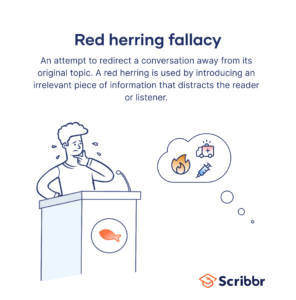What Is a Red Herring Fallacy? | Definition & Examples
A red herring fallacy is an attempt to redirect a conversation away from its original topic. A red herring is used by introducing an irrelevant piece of information that distracts the reader or listener. This can be intentional or unintentional.
As a result, one can divert others’ attention away from the original discussion topic or avoid answering a difficult question.
Although worse criminals do exist, this is a separate issue. The real issue is that the driver exceeded the speed limit, and this is punishable.
What is a red herring fallacy?
A red herring fallacy is a form of logical fallacy or reasoning error that occurs when a misleading argument or question is presented to distract from the main issue or argument at hand.
Red herring refers to the piece of information that is used as a diversion. Mystery novels, for instance, often feature a character who draws the reader’s attention as a potential suspect but is ultimately proven innocent. In this case, the red herring is used as a literary device to send the reader down the wrong path, creating a plot twist and delivering a surprise ending.
Sometimes, a red herring is used as a rhetorical strategy to persuade others, or even used accidentally in argumentation, in which case we call it a red herring fallacy. For example, politicians often use it as a diversion tactic to evade difficult questions asked in public. Instead of answering the question, they may start talking about some unrelated topic to distract their audience.
What is a logical fallacy?
Logical fallacies are common errors in reasoning that render an argument logically invalid. Fallacies can be either illegitimate arguments or irrelevant points, and they can be identified because they lack evidence that supports their claim. Although they are not logically sound, they appear solid at first and therefore can easily go unnoticed.
Fallacies may be committed intentionally to persuade and deceive others, or unintentionally, for several reasons, such as ignorance or language barriers. They are categorised according to their logical structure as formal fallacies (like ecological fallacy) or their content as informal fallacies. The red herring fallacy is an informal fallacy. More specifically, it is a fallacy of relevance: it concerns arguments or statements that seem relevant although they are not.
Why do people use a red herring fallacy?
In general, people use a red herring fallacy to distract from the discussion. This can happen for several reasons. They may be attempting to:
- Reroute a discussion by steering it onto a highly controversial topic that is likely to attract people’s attention
- Confuse people by introducing a vague statement, causing them to forget the original topic
- Avoid answering a difficult question head-on, especially when people feel cornered or pressured to defend themselves
- Avoid discussing a personal matter during a friendly conversation
It is important to remember that people who commit a red herring fallacy do not always intend to manipulate others. Sometimes, they do it without even realising it, and it can sometimes be a justified effort to change the subject.
Red herring fallacy examples
Red herring fallacy can be observed in different contexts, such as in the media, in politics, or in advertising.
In one commercial, the narrator asks questions and moves through random settings: a beach, a lake, a kitchen, a waterfall, etc. The narrator addresses women, asking them how they would like their partners to smell.
These rapid-fire questions and quick changes of scenery are entertaining and visually compelling, but they have nothing to do with the product’s characteristics – they are a red herring. In other words, they distract the viewer from learning anything about the product.
This is a common practice in advertising, especially for products that don’t have any clear advantage over competitors.
Politicians often use the red herring fallacy to their advantage: by cleverly missing the point, they draw attention away from the argument or question.
Journalist: “In the recent past, there have been multiple corruption issues in the local government. How do you plan to combat corruption?”
Candidate: “I have a solid plan for combating corruption, and I also have a ten-point plan for creating more jobs. What we need is economic growth, so the first point in my ten-point employment plan is …”
This is all too common in political debates and interviews: a politician is asked a direct question, and before you realise it, they’re talking about something else.
Looking for unsound arguments like the red herring fallacy is important if we want to critically evaluate information that we encounter online.
“Information that I saw online about COVID-19 causing infertility in the summer was removed. I heard it’s because of lawsuits related to Bill Gates and the vaccines in Africa. Does this have to do with the COVID-19 vaccines causing infertility?”
This is an example of red herring fallacy. Perhaps the person who asked the question online had no intention to confuse or misinform others, but they did commit a reasoning error.
The discussion about the removal of information and lawsuits involving Bill Gates distracts from the primary concern: whether COVID-19 vaccines cause infertility. In addressing this concern, it is important to focus on the question related to the vaccine’s safety rather than the peripheral discussions related to online information and lawsuits.
How to respond to a red herring fallacy
It is important to be able to spot a red herring fallacy in others’ arguments so that a false line of reasoning won’t fool you. Depending on the situation, here are some ways you can respond to this fallacy:
- Point out to your discussion partner that they are using a red herring and challenge it before you are dragged off to an irrelevant point. For example, simply counter: “That’s a red herring. It has nothing to do with the topic.” Then go on to explain why their argument is irrelevant.
- People who deliberately resort to the red herring fallacy will probably refuse to admit that what they are saying is irrelevant to the conversation. In this case, the best way to deal with it is probably by circling back to the main topic, while offering to come back to the other person’s concerns later on.
- If you are unsure whether the other person is using a red herring or not, ask them to justify it or elaborate further on their argument.
- Sometimes, people don’t wish to divulge personal information and may use a red herring fallacy to that end. In this case, the best thing to do is to accept it and move on with the discussion.
Other interesting articles
If you want to know more about fallacies, research bias, or AI tools, make sure to check out some of our other articles with explanations and examples.
AI tools
Fallacies
Frequently asked questions about the red herring fallacy
Sources for this article
We strongly encourage students to use sources in their work. You can cite our article (APA Style) or take a deep dive into the articles below.
This Scribbr articleNikolopoulou, K. (2023, August 28). What Is a Red Herring Fallacy? | Definition & Examples. Scribbr. Retrieved 22 December 2025, from https://www.scribbr.co.uk/fallacy/the-red-herring-fallacy/
Rivera, H. (2018). Red Herring. In Bad Arguments (pp. 208–211). https://doi.org/10.1002/9781119165811.ch43




